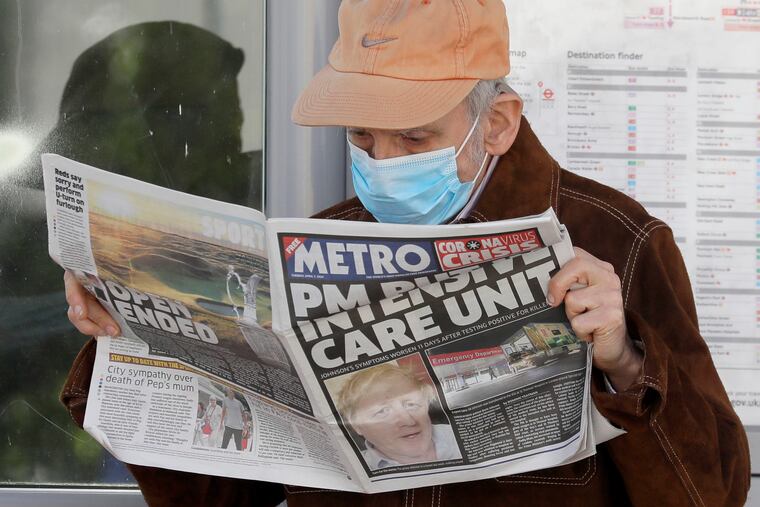With Prime Minister Boris Johnson in ICU with coronavirus, Britain asks: Who’s in charge?
As British Prime Minister Boris Johnson fights the coronavirus in the intensive care unit of a London hospital, the people of his country are wishing him well and also wondering who’s in charge

LONDON — As British Prime Minister Boris Johnson fights the coronavirus in the intensive care unit of a London hospital, the people of his country are wishing him well — and asking who’s in charge.
The answer is ambiguous. Britain’s unwritten constitution does not spell out what happens if a prime minister becomes unable to perform his or her job.
There is no official role of acting or deputy prime minister, and heads of government only leave office through resignation or death, Alex Thomas, a program director at the Institute for Government, political think-tank, said.
“Boris Johnson continues as prime minister for as long as neither of those things happens,” he said.
The U.K.'s leaders can appoint someone to fill in for them temporarily during illness or absences. When he was admitted to the hospital Sunday night, Johnson asked Foreign Secretary Dominic Raab -- who also holds the title first secretary of state -- to take over many of his duties “where appropriate.”
The wording has caused some confusion about the limits of Raab’s powers and whether he is authorized to make major policy decisions, or even take the country to war.
» FAQ: Your coronavirus questions, answered.
Johnson’s official spokesman, James Slack, said Tuesday that Raab would lead the government's response to the coronavirus outbreak, and would also be able to lead meetings of the National Security Council, though none is currently scheduled.
But Raab can’t fire Cabinet ministers or senior officials, and he won’t hold the prime minister’s weekly audience with Queen Elizabeth II.
In the British political system, the prime minister’s power lies less in the role's specific responsibilities — which are relatively few — than in the leader's political capital and authority as “first among equals” in the Cabinet.
That’s especially true in Johnson’s government, which is made up of relatively inexperienced ministers appointed by a prime minister with a big personality and a hefty personal mandate from a resounding election victory in December.
» READ MORE: Britain Prime Minister Boris Johnson in stable condition in ICU; not on ventilator
“This was not a Cabinet of equals,” said Jill Rutter, a former civil servant and senior research fellow at the U.K. in a Changing Europe think tank. “This was Boris Johnson and his people.”
Raab's “lack of political authority” might become noticeable if it is time to make major decisions, like when to ease the country’s coronavirus lockdown in an attempt to revive the economy.
Restrictions on movement and economic activity were imposed March 23 in response to COVID-19, initially for three weeks. That means a review is needed next week. With the government’s medical advisers saying infections have yet to peak in the U.K. and more than 6,100 deaths reported so far, it’s unlikely the restrictions will be lifted that soon.
British officials are hoping Johnson will be back at his desk by the time the decision has to be made.
If Johnson did become unable to return to work, he could resign and pick a successor, whom the queen would be asked to appoint as prime minister. If Johnson couldn't make a preference known, the remaining Cabinet members would be expected to choose a replacement.
“If they can’t agree, then that puts us in very difficult constitutional territory,” Thomas said.
By convention, though not law, the prime minister should also be leader of the governing Conservative Party. But with Parliament suspended because of the virus, it might be some time before lawmakers could hold a leadership election.